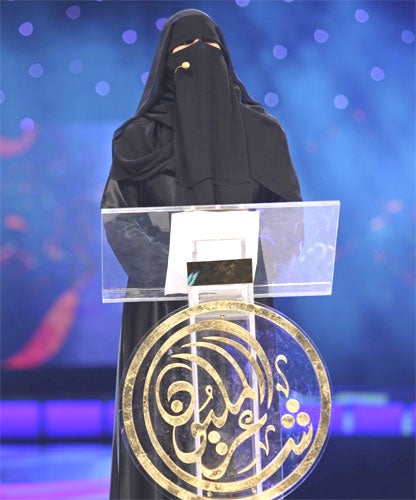Saudi woman poet lashes out at clerics in 'Arabic Idol'
Abu Dhabi judges praise courage of writer who dared to criticise hardliners

Your support helps us to tell the story
From reproductive rights to climate change to Big Tech, The Independent is on the ground when the story is developing. Whether it's investigating the financials of Elon Musk's pro-Trump PAC or producing our latest documentary, 'The A Word', which shines a light on the American women fighting for reproductive rights, we know how important it is to parse out the facts from the messaging.
At such a critical moment in US history, we need reporters on the ground. Your donation allows us to keep sending journalists to speak to both sides of the story.
The Independent is trusted by Americans across the entire political spectrum. And unlike many other quality news outlets, we choose not to lock Americans out of our reporting and analysis with paywalls. We believe quality journalism should be available to everyone, paid for by those who can afford it.
Your support makes all the difference.Instead of Jon and Edward dressed as the Ghostbusters, it featured a single woman covered from head to toe in black, declaiming traditional Arabic poetry from a podium. And rather than Cheryl Cole or Dannii Minogue in a revealing designer outfit, the judging panel consists of five sober-looking men with bushy moustaches, and a similarly all-male audience.
The X Factor it isn't – but Abu Dhabi's live poetry talent contest, The Million's Poet, which is broadcast across the Arab world, features something far more subversive than its British equivalent could ever manage.
Tonight, Hissa Hilal, a mother-of-four from Saudi Arabia, takes to the stage in the last round of a competition that she has taken by storm with a scathing critique of the conservative clerics who hold sway in her country. Her poetry has earned her the praise of the judges, the acclaim of the viewing public – and more than a few death threats.
Ms Hilal earned her place in the final with a performance last week, which was seen as a response to a prominent Saudi cleric's call for those who advocated the mingling of men and women to be punished with death. In a 15-verse work, she railed against preachers who "sit in the position of power", "frightening" people with their religious edicts.
"I have seen evil in the eyes of fatwas, at a time when the permitted is being twisted into the forbidden," she said, with only her microphone and her eyes visible against the uniform black of her burqa. The clerics, she went on – and, by extension, suicide bombers who wrap explosives around their waists – "are vicious in voice, barbaric, angry and blind, wearing death as a robe cinched with a belt".
It was a bold message indeed, and in Saudi Arabia, where unmarried men and women are entirely segregated, a highly controversial one. But when she finished, the ranks of men listening erupted into cheers, and the judges sent her into today's final with compliments ringing in her ears.
"Hissa Hilal is a courageous poet," said Sultan al-Amimi, one of the show's judges. He praised her for "expressing her opinion" and "raising an alarm" against extremist clerics.
Ms Hilal herself, meanwhile, is uncompromising in the face of the threats that have emerged on militant websites. "My poetry has always been provocative," she told the Associated Press. "It's a way to express myself and give voice to Arab women, silenced by those who knock our culture and our religion."
The Million's Poet is a particularly remarkable venue for her message given the conservatism of its format. Whereas rivals like Superstar and Star Academy mimic the content of Western talent contests like American Idol and The X Factor, the introduction of traditional poetry has brought the show a wider audience that includes many who might normally dismiss Ms Hilal's message.
"The show is at the heart of cultural conversations in the Arab world," says Lina Khatib, an Arab media expert at Stanford University. "It's a hybrid of the modern and the traditional. So it's packaged within acceptable parameters. Because it's poetry, one of the most respected forms of expression in the Arab world, you can push the boundaries much further than you might with popular music."
In tonight's final, Ms Hilal plans to focus on the media; Jaza al-Baqmi, one of her rivals , will devote her performance to the role of women in Arab culture. The winner will pocket Dh1m (£900,000).
But despite the life-changing money on offer, Ms Hilal is a little taken aback by the sudden fame that the show has brought her. "I worry how I will be perceived after the show is over," she said. "I worry the lights of fame will affect my simple and quiet existence."
Join our commenting forum
Join thought-provoking conversations, follow other Independent readers and see their replies
Comments